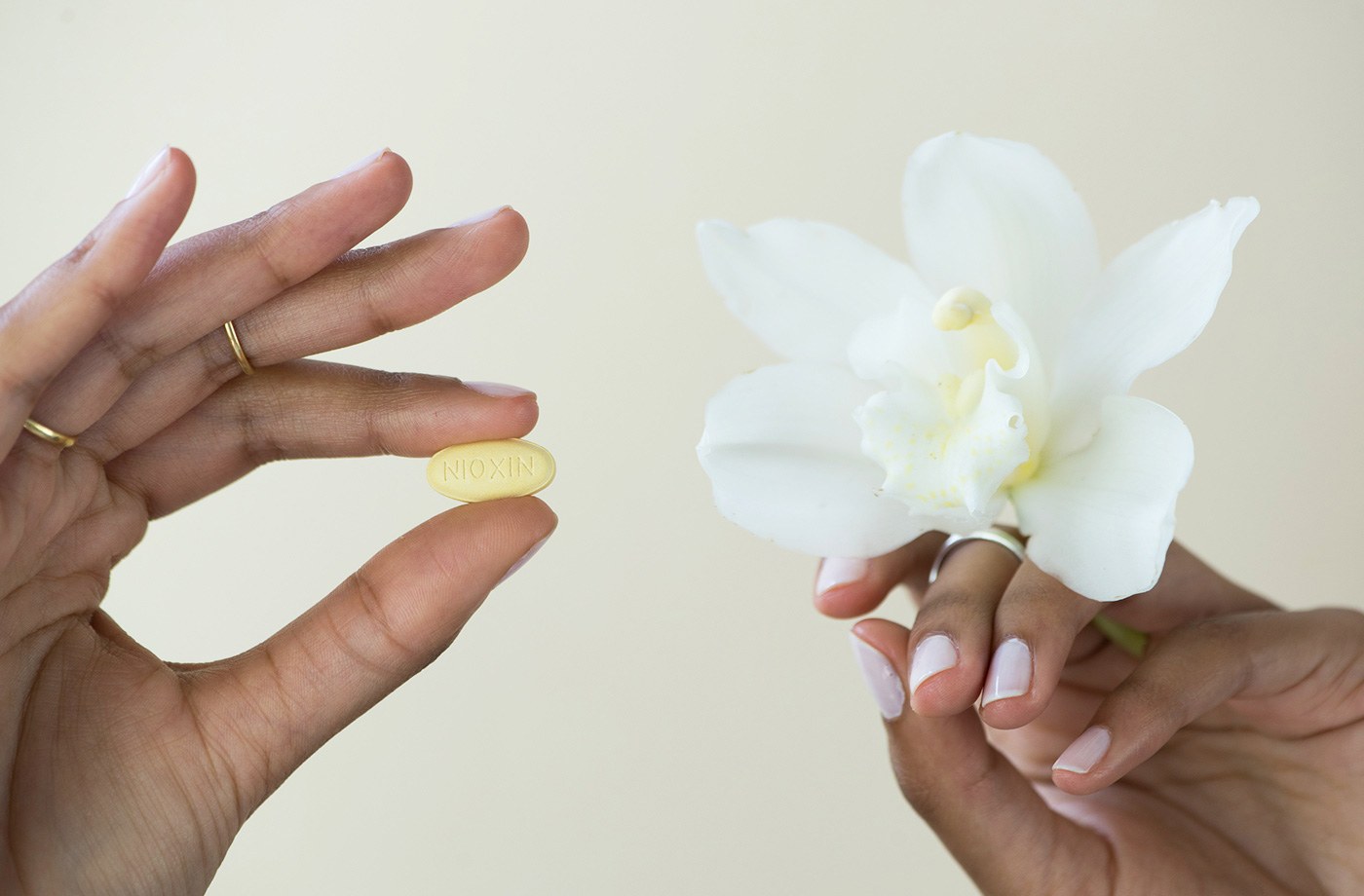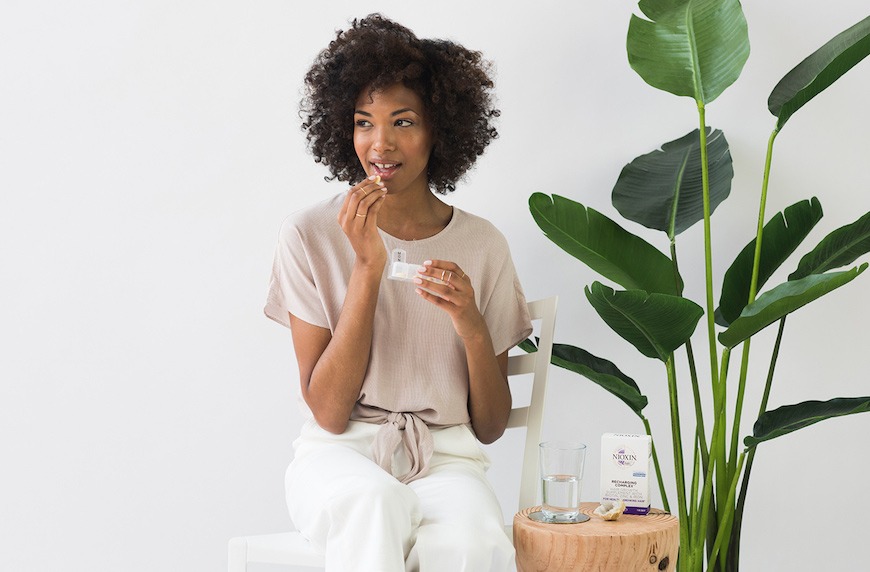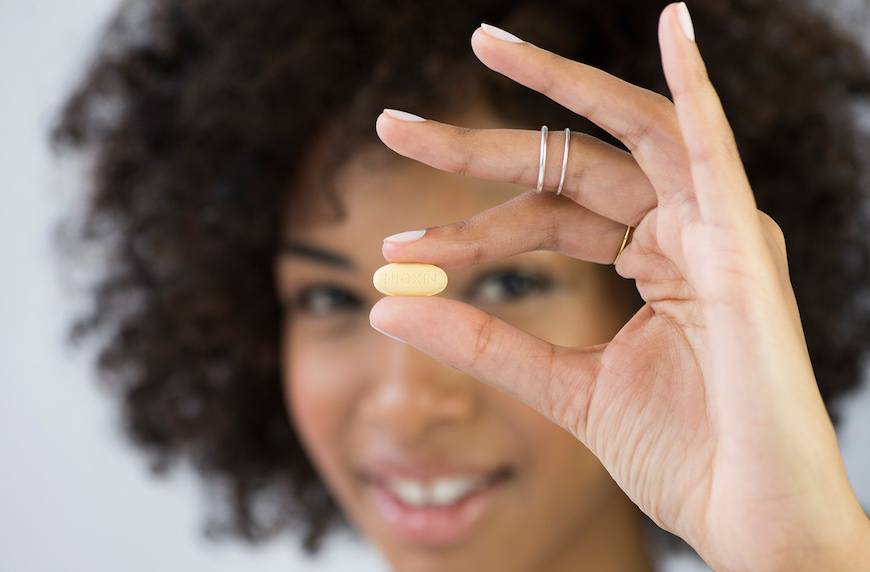Newsflash: Female Hair Loss Is Way More Common Than You Think—and Here’s What You Can Do About It
First off, shedding strands is common (welcome to the club). Unless your hair loss is genetic or caused by a medical condition, though, there are a few ways to stave off the excessive thinning of your crowning glory—and we tapped NYC-based integrative nutrition health coach Maria Marlowe for the scoop.
The most common hair questions she hears during client one-on-ones include “how can I make my hair grow?” and “why am I losing so much hair?” Turns out, your diet can have a huge impact on your locks (good and bad). “What we eat influences our hair in many ways,” Marlowe says. “Lacking certain nutrients can slow hair growth, leave it weak and dull, and contribute to both dandruff and hair loss.”
The good news? You have the power to keep those good hair days rolling in. Specifically, eat well with the help of Marlowe’s brilliant tips below and supplement accordingly with the just-launched RECHARGING COMPLEX™ hair supplement by NIOXIN (yup, you likely recognize the name from your appointments at top salons). Hair flip-worthy tresses coming right up.
Keep reading for 3 steps you can take for thicker, fuller hair.

1. Add a supplement for stronger strands
You’re a pro at counting macros and eating the rainbow ( a.m. smoothie bowls, what up?) but you might be missing out on key nutrients which sustain hair growth. “Deficiencies in iron, zinc, and biotin, to name a few, have been associated with hair loss,” Marlowe says. “The good news is hair loss related to nutrient deficiencies generally isn’t permanent and can be rectified by adding in the nutrient.”
The once-a-day RECHARGING COMPLEX™ is made for both women and men, and it's loaded with a blend of 16 essential nutrients including biotin (for healthy hair follicles), zinc (for a healthy scalp), and iron (boost circulation). In short, the supplement's M.O. is strengthening your strands and promoting growth from the inside out.

2. Avoid foods that may lead to hair thinning
You've got plenty of reasons to limit your sweet tooth habit to dark chocolate and ease up on refined carbs, like maintaining your energy throughout the workday. But here’s another motivator to quit most processed snacks: “Eating pro-inflammatory foods like sugar and refined grains can also hamper our hair growth and contribute to loss,” Marlowe says.
Foods that are high in sugar, high-glycemic foods like bread and pasta, and unhealthy oils (see: hydrogenated oils, which can spark inflammation) can all lead to thinning hair. "When your body pumps out insulin in response to a blood-sugar spike caused by sweets or high-glycemic foods, levels of dihydrotestosterone (DHT) and other androgens (male hormones) increase, which can make the hair follicle shrink and cause hair loss,” Marlowe explains.
And if you’re a huge sushi or lobster-roll fan, you may want to pay attention to your exposure to mercury. Mercury buildup in your body can also lead to brittle nails and thin hair. Marlowe’s tip: “Limit sushi and fish to 2 to 3 times a week max, and stick to low-mercury fish and a serving size of 3 to 4 ounces.”

3. Load up on the good-for-locks ingredients
As if you needed another reason to add beans, lentils, eggs, seeds (particularly pumpkin, flax, and hemp), avocado, and dark leafy greens to your cart, they actually make up a healthy-hair grocery list.
These ingredients, according to Marlowe, are packed with nutrients needed for hair growth including biotin, B vitamins, and vitamin C (which reduces the amount of free radicals in the body which can deter new strands from sprouting).
“B-vitamins help create red blood cells, which carry oxygen and nutrients to the scalp and hair follicles which is important for hair growth,” Marlowe says. “Biotin in particular is the most well-known B vitamin for hair health, but the truth is, B1, B2, B3, B6, B12, and folate (B9) also play an integral role.” And if you miss some of these items in your weekly meal prep? There's always a supplement for that.
In partnership with NIOXIN
Photos: Tim Gibson for Well+Good
Loading More Posts...